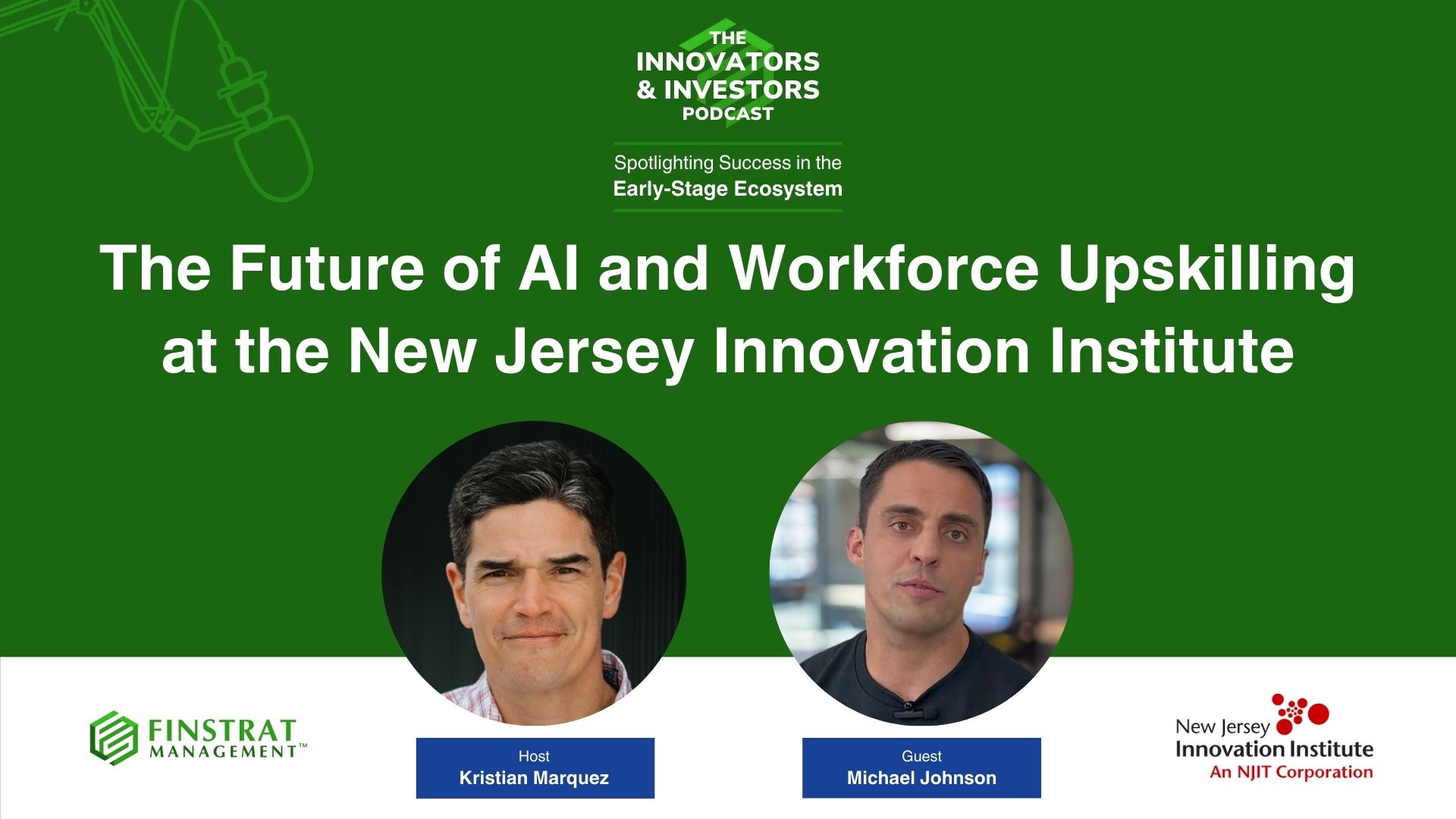From PhD to CEO: Michael Johnson on Innovation, AI Adoption, and Building NJ’s Unique Venture Studio
September 24, 2025 | 38 MIN

Highlights
- NJII acts as a critical conduit between higher education and industry to accelerate translational research and innovation.
- Michael’s biotech startup developed a 3D tissue imaging platform, transforming traditional histopathology and supporting top pharma clients.
- Higher education faces a demographic cliff, rising costs, and funding cuts; STEM-focused schools with innovation institutes have a competitive edge.
- NJII’s independent 501©(3) status allows agility in contracts, venture funding, and startup creation, differentiating it from traditional university entities.
- NJII prioritizes practical AI adoption for small and mid-sized businesses and workforce upskilling to stay competitive.
- The institute is exploring blockchain and DeFi solutions, especially for commerce and government applications.
- Michael stresses mentorship as critical to entrepreneurial success and personal growth.
Summary
In this episode of The Innovators and Investors Podcast, host Kristian Marquez interviews Michael Johnson, president of the New Jersey Innovation Institute (NJII). Michael shares insights about NJII’s role as a bridge between academia and industry, focusing on translational research, innovation, and workforce upskilling. The organization supports entrepreneurship, defense-related advanced manufacturing, healthcare IT, and artificial intelligence adoption for small and mid-sized businesses. Michael also recounts his journey as a PhD scientist who co-founded a biotech company, Visikal, which developed a revolutionary 3D tissue imaging platform to improve drug discovery and was ultimately sold to a public Swedish company.
He discusses challenges facing higher education, including declining enrollments, demographic shifts, rising costs, and reduced federal funding, highlighting that STEM-focused institutions with strong innovation arms like NJII are better positioned for the future. Michael explains NJII’s unique governance model as an independent 501©(3) that enables nimble decision-making, quick contract execution, and venture fund management, allowing it to build startups from university IP and corporate ideas.
The discussion then moves to current innovation trends, where Michael emphasizes AI adoption in practical business applications, workforce development, and emerging blockchain/crypto opportunities. He stresses the importance of mentorship, sharing lessons from his entrepreneurial journey and decision to sell his company amid market uncertainties. Michael closes with advice on seeking mentors and acknowledges his wife’s support as a key factor in his success.
Key Insights
- Bridging Academia and Industry: NJII’s unique structure enables it to overcome traditional barriers in higher education collaboration by acting as an independent entity with direct access to university resources, faculty, and research. This model accelerates translational research and commercialization, which is essential given that basic and applied research increasingly resides in academia, yet industry often struggles to access these innovations efficiently. NJII’s approach offers a blueprint for other institutions seeking to enhance innovation ecosystems.
- Founders with Scientific Expertise Drive Impactful Innovation: Michael’s journey from PhD student to biotech founder exemplifies how deep scientific knowledge combined with entrepreneurial drive can create breakthrough technologies. Their 3D imaging platform disrupted the century-old 2D histopathology paradigm, providing richer data for drug discovery and safety evaluation. This highlights the value of scientists who can navigate both research and commercial landscapes, bridging the “valley of death” in technology transfer.
- Challenges in Higher Education Demand Innovation and Efficiency: The demographic cliff, declining test scores, rising tuition, and cuts in federal and international student funding create a precarious environment for many colleges. However, institutions like NJIT with a focus on STEM and practical ROI demonstrate resilience. The shift towards affordable, high-return education models tied to workforce needs is critical for sustainability. NJII’s role in fostering applied innovation aligns well with this trend, positioning the school as a leader in relevant education and economic development.
- Governance and Organizational Structure as Competitive Advantages: NJII’s status as a separate nonprofit with its own board, HR, CFO, and venture fund enables rapid response to market needs, unlike traditional universities encumbered by bureaucracy. This autonomy allows NJII to sign leases, build facilities, and launch companies swiftly. This governance innovation is rare nationally and illustrates how hybrid organizational models can combine academic rigor with business agility, a key enabler for regional innovation ecosystems.
- Pragmatic AI Adoption for Small and Mid-Sized Businesses: Instead of chasing cutting-edge AI in tech hubs, NJII focuses on helping traditional industries such as construction, healthcare, and law enforcement integrate AI to solve concrete business problems—cost overruns, project delays, efficiency. This approach demystifies AI for companies that lack internal expertise or resources and offers scalable, impactful solutions without massive consulting fees. This practical strategy fosters broader AI adoption and workforce upskilling, critical for regional competitiveness.
- Venture Studio Model for Company Creation: NJII’s venture fund and studio systematically build startups around university IP and corporate “shelf” technologies that companies cannot commercialize themselves. By providing funding, management talent, and access to corporate customers from day one, NJII reduces startup risk and accelerates commercialization. This model leverages public-private partnerships and is a powerful mechanism to drive regional economic growth by converting innovation assets into market-ready companies.
- Mentorship as a Catalyst for Entrepreneurial Success: Michael’s reflections underscore how crucial experienced mentors are in guiding startup founders through common pitfalls. Mentors provide not only technical or domain advice but help with strategic decision-making, timing exits, and managing investor expectations. The scarcity of such guidance is a major barrier for many entrepreneurs, making intentional mentorship programs vital within innovation ecosystems. Michael’s emphasis on giving back also highlights the importance of sustaining supportive networks.
This interview with Michael Johnson provides a comprehensive look at how innovation institutes linked to universities can catalyze technology transfer, startup creation, and workforce development amid challenging environments in higher education and industry. NJII’s unique structure, pragmatic focus on AI and emerging tech, and venture studio model exemplify innovative approaches to fostering regional innovation. Michael’s personal journey and insights into mentorship add valuable lessons for entrepreneurs and ecosystem builders alike. The discussion emphasizes adaptability, collaboration, and the critical role of governance and leadership in translating research into real-world impact.
Stay up-to-date with Michael Johnson and his work with NJII.
Follow our show on your podcast channel of choice or listen below.




